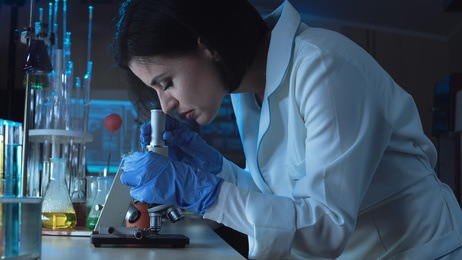UAMS researcher receives $1.2 million grant
by August 15, 2019 11:56 am 204 views

Researcher Dr. Robert Eoff has received a $1.2 million grant from the National Science Foundation to continue his work at the University of Arkansas for Medical Sciences (UAMS) on DNA damage, cell replication and its implications for diseases like dementia, ALS and cancer.
Eoff is an associate professor in the Department of Biochemistry and Molecular Biology in the UAMS College of Medicine and a member of UAMS’ Winthrop P. Rockefeller Cancer Institute. Dr. Julie Gunderson, assistant professor of physics at Hendrix College in Conway, is collaborating with Eoff on the project. The four-year grant will also support graduate student training at UAMS and undergraduate trainees at Hendrix.
Eoff’s research team studies what happens when DNA damage is not repaired in a timely manner and ends up blocking the mechanics behind how copies of new cells are made. Specifically, he studies the effect of large amounts of guanine in DNA sequences, which can form unusual structures called G-quadruplexes (G4).
“Imagine trying to copy a document containing over six billion letters in the span of a few hours,” Eoff said. “Now imagine finding that the text contains many words like ‘Mississippi,’ ‘Czechoslovakia,’ ‘Oberschleissheim’ and ‘Solgohachia.’ Even though you’re on a tight schedule, you might have to slow down a bit when you come to those tricky words. As it turns out, this is probably a good analogy for what happens when enzymes involved in DNA replication encounter certain sequences that contain an abundance of guanine bases.”
Errors in these G4 sequences can lead to changes in the genome that are associated with human disease. For example, neurological diseases such as frontotemporal dementia, amyotrophic lateral sclerosis (ALS), and the intellectual disability fragile X syndrome have all been linked to dysfunctional G4 maintenance.
There is also a substantive and growing body of literature linking G4 to the biology of cancer and cancer therapies. Many cancer-related genes are controlled by G4 motifs, and chromosomes in tumor specimens tend to be broken more frequently near G4 sites than other DNA sequences.
However, scientists do not fully understand how these errors occur.
For this specific grant, Eoff will study the role of a special enzyme called Rev1 in copying G4 sequences. Rev1 is a DNA polymerase — an enzyme that catalyzes synthesis of new strands of DNA.
“Successful completion of this research will give us a better understanding of how G4 replication errors occur and how they might have come about in the first place,” Eoff said. “Hopefully, this will give us new insight into replication barriers, which cause a wide range of issues in humans and other species, as a first step toward putting this greater understanding to use in the form of new treatments and therapies.”
